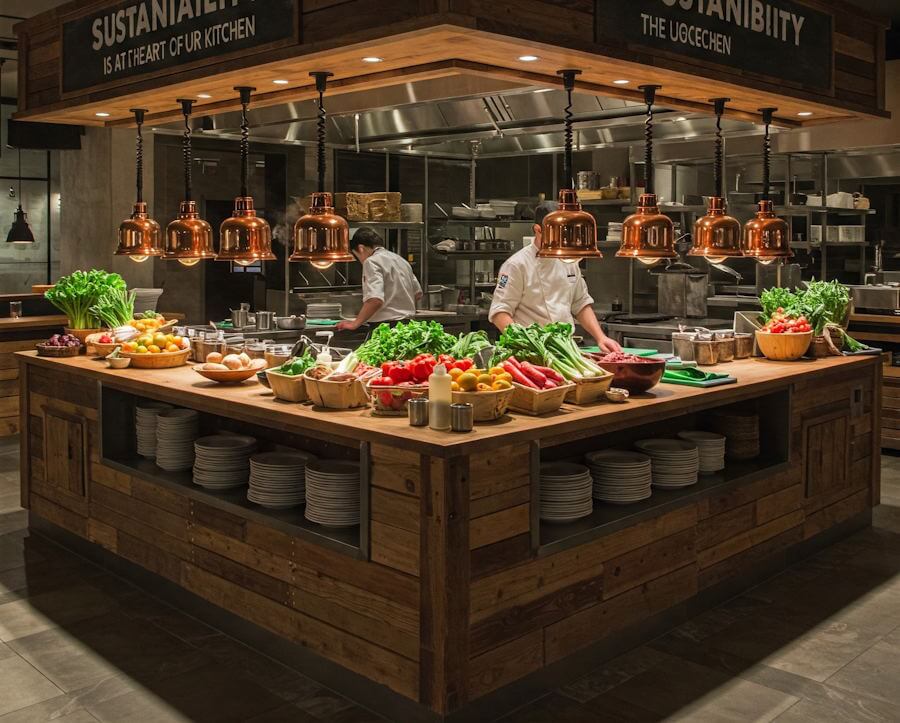Introduction to Sustainable Cooking
Sustainable cooking refers to the practice of preparing food in a manner that minimizes environmental impact while promoting health and social equity. In recent years, the significance of this concept has gained momentum as individuals and communities become increasingly aware of the consequences of their culinary choices. The modern kitchen, often seen as the heart of the home, plays a critical role in implementing sustainable practices that benefit both our well-being and the planet.
The importance of sustainable cooking lies not only in its direct benefits to the environment but also in its implications for personal health and the economy. Traditional cooking methods and food sourcing often involve significant carbon footprints and resource depletion, leading to detrimental environmental effects. By adopting sustainable practices, such as utilizing locally sourced ingredients, reducing food waste, and opting for seasonal produce, we can mitigate these impacts. These practices promote biodiversity, reduce greenhouse gas emissions, and contribute to healthier ecosystems.
Additionally, sustainable cooking fosters better health outcomes. Foods that are fresh and minimally processed tend to be more nutritious, offering a range of essential vitamins and minerals. By making conscious choices about the ingredients we select, we not only nourish our bodies but also support food systems that prioritize health and sustainability. On the economic front, sustainable cooking supports local farmers and businesses, strengthening community ties and promoting fair trade practices, which provide equitable income to producers.
In summary, sustainable cooking is a holistic approach that intertwines environmental consciousness with health and economic stability. As individuals embrace these practices in their kitchens, they contribute to a larger movement towards a sustainable future, where culinary traditions align with the principles of stewardship for our planet and its resources.
The Environmental Impact of Food Choices
Food choices play a significant role in shaping the ecological landscape, with profound effects on carbon emissions, water usage, and biodiversity. Understanding these impacts is crucial for promoting sustainability within our kitchens. The agricultural sector is a major contributor to greenhouse gas emissions, accounting for approximately 25% of global emissions. This is especially true for meat and dairy production, which presents a higher carbon footprint compared to plant-based alternatives. For instance, producing one kilogram of beef can result in emissions of around 27 kilograms of CO2 equivalents, while vegetables and grains generate considerably lower emissions.
Water usage is another vital factor in evaluating the sustainability of food selections. The production of various crops can require staggering quantities of water. For example, it takes roughly 1,800 gallons of water to produce a single pound of beef, whereas plant foods such as beans and lentils require far less. This discrepancy highlights the need for conscious eating habits. By opting for water-efficient crops, consumers can significantly lower their impact on water resources, which are increasingly under threat from climate change and over-extraction.
Biodiversity loss is also an alarming consequence of food production practices. Intensive farming methods often result in habitat destruction and monocultures, which displace numerous species and diminish ecosystem resilience. Choosing sustainably sourced foods, such as organic produce, can aid in the conservation of biodiversity. These choices support farming practices that promote soil health and protect natural habitats.
Ultimately, making informed food choices empowers individuals to contribute positively to the environment. By prioritizing low-impact foods and sustainable agricultural practices, we can collectively work towards a kitchen that embodies sustainability and promotes a healthier planet.
Seasonal and Local Sourcing
Sourcing ingredients seasonally and locally stands at the core of our kitchen’s sustainability mission, presenting numerous advantages that resonate through our menus and the communities we serve. By prioritizing local farming, we actively reduce transportation emissions associated with importing produce from distant locations. This reduction is critical in combating climate change, as it minimizes the carbon footprint of our meals while simultaneously promoting healthier agricultural practices that are often found within our own regions.
Moreover, supporting local economies is another significant benefit of embracing seasonal and local sourcing. When we choose to procure ingredients from nearby farmers and producers, we contribute to the livelihood of local families and businesses. This practice fosters a strong sense of community while ensuring that we foster resilient local economies sustainable for future generations. Purchasing from local sources also encourages biodiversity, as farms are more likely to grow a variety of crops that are suited for the local environment, thereby enhancing ecological balance.
Furthermore, the flavor profile of seasonal produce tends to be superior compared to those that are transported over long distances. Ingredients harvested at their peak ripeness are not only more nutritious but also provide an unparalleled freshness that enhances the overall dining experience. By incorporating seasonal selections into our cuisine, we create dishes that are vibrant and full of flavor, showcasing the best offerings of each particular season.
To effectively choose seasonal produce, one can visit local farmers’ markets, establish relationships with community-supported agriculture (CSA) programs, or even consult seasonal produce calendars available online. These resources guide consumers in making informed decisions, ensuring that their culinary choices reflect the natural rhythm of the environment. Ultimately, embracing local and seasonal sourcing is not merely a trend; it is a vital step towards building a sustainable kitchen that values ecological integrity and community well-being.
Waste Reduction Techniques
Reducing waste in the kitchen is a pivotal component of promoting sustainability. Implementing effective strategies not only minimizes the environmental impact but also enhances the efficiency of our cooking processes. One of the most effective ways to achieve waste reduction is through the proper utilization of leftovers. Rather than discarding uneaten food, consider transforming these remnants into new meals. For instance, roasted vegetables from one meal can be easily repurposed into a hearty soup or mixed into a grain salad. This approach not only reduces food waste but also encourages creativity in cooking.
Another essential technique is meal planning. By thoughtfully preparing a weekly menu, you can ensure that you purchase only what you need, thereby minimizing food spoilage. Make a shopping list based on your planned meals and stick to it, which helps avoid impulse buys that may go unused. Furthermore, organizing your pantry and fridge can assist in keeping track of your ingredients. By placing older items at the front, you are more likely to use them, thereby reducing the chances of food waste.
Compiling food scraps can also serve as an excellent method of waste reduction. Composting not only diverts organic waste from landfills but also creates nutrient-rich soil for gardening. By utilizing kitchen scraps such as vegetable peels, coffee grounds, and eggshells, homeowners can significantly reduce the amount of waste produced. Composting is a straightforward practice that contributes positively to overall environmental sustainability. Apart from employing these strategies, educating oneself and others about the importance of reducing food waste can catalyze a broader cultural shift toward a more sustainable way of living.
Energy Efficiency in Cooking
Improving energy efficiency in the kitchen is crucial for reducing our carbon footprint and promoting sustainability. One effective approach is to invest in energy-efficient appliances that consume less electricity while delivering optimal performance. These appliances, such as induction cooktops and energy-star-rated ovens, utilize advanced technology to minimize energy wastage. Additionally, they often cook food more quickly, thereby conserving energy and time, allowing for a more sustainable culinary experience.
Choosing the right cooking methods is equally important for enhancing energy efficiency. For instance, using a slow cooker or pressure cooker can significantly reduce energy consumption compared to traditional stovetop cooking. These methods harness heat more effectively, leading to delicious meals without the intensive energy input associated with conventional methods. Steaming and microwaving food are also energy-efficient techniques, as they require less time and energy to cook while preserving nutrients in the food.
Optimizing cooking times and temperatures further contributes to energy efficiency. Preheating an oven, for example, can be minimized or even avoided when using certain appliances like convection ovens, which circulate hot air to cook food evenly. Understanding the right temperatures and cooking durations for various foods can prevent unnecessary energy usage. Batch cooking is another practice that maximizes efficiency; preparing larger quantities of meals in one go reduces the frequency with which an oven or stovetop must be used. This strategy not only saves energy but also reduces food waste, as planned leftovers allow for more sustainable meal planning.
In conclusion, by adopting energy-efficient appliances, selecting appropriate cooking methods, and optimizing temperatures and times, individuals can significantly enhance energy efficiency in their kitchens. These changes not only contribute to sustainability but also foster a conscious approach to food preparation, ultimately benefiting both the environment and our household energy consumption.
Sustainable Practices in Kitchen Cleaning
Maintaining a sustainable kitchen involves not only the selection of local and organic ingredients but also the use of eco-friendly cleaning products. Conventional cleaning agents often contain harmful chemicals that can pose risks to both human health and the environment. By opting for non-toxic cleaning solutions, individuals can significantly reduce their ecological footprint while ensuring a safe environment for food preparation and consumption.
There are several effective and environmentally friendly alternatives to traditional cleaning products. For instance, a simple mixture of vinegar and baking soda can powerfully tackle stains and sanitize surfaces without the adverse effects often associated with commercial cleaners. Additionally, choosing biodegradable soaps and detergents further minimizes the pollution associated with kitchen cleaning. These products break down naturally and do not contribute to the accumulation of toxins in waterways and soil.
Proper disposal methods also play a crucial role in sustaining an eco-friendly kitchen. It is essential to read labels carefully and understand how to dispose of cleaning product containers appropriately, as many are not recyclable. Furthermore, when transitioning to a sustainable kitchen, consider reducing the use of plastic cleaning supplies. Reusable cloths made from natural fibers can replace disposable wipes, while glass or stainless-steel spray bottles can be used to store homemade cleaning solutions instead of single-use plastic bottles.
Moreover, adopting practices such as bulk buying can help reduce packaging waste. Purchasing cleaning supplies in larger quantities not only diminishes the amount of plastic waste but often proves to be more economical in the long run. Incorporating these sustainable practices into your kitchen cleaning routine can significantly contribute to a healthier planet and an eco-conscious lifestyle.
The Role of Plant-Based Diets
The adoption of plant-based diets plays a pivotal role in fostering environmental sustainability. By prioritizing plant-centric meals, individuals can significantly lower their carbon footprints. Research indicates that animal agriculture is responsible for a considerable portion of greenhouse gas emissions, primarily due to methane production and deforestation for livestock grazing. In contrast, plant-based foods typically require fewer resources in terms of land, water, and energy, allowing for a more sustainable approach to food consumption.
In addition to environmental benefits, a diet rich in plant-based foods offers numerous health advantages. Studies have shown that individuals who consume more fruits, vegetables, legumes, and whole grains often experience lower rates of chronic conditions such as heart disease, diabetes, and obesity. By incorporating more plant-based meals, individuals not only contribute to the environment but also enhance their own health and well-being.
Transitioning to a plant-based cooking style need not be an overwhelming process. One effective approach is to gradually introduce more plant-based ingredients into familiar recipes. For instance, substituting lentils for ground meat in spaghetti sauce or integrating more vegetables into traditional casseroles can create delicious and satisfying meals. Additionally, experimenting with new cuisines that emphasize plant-based foods can broaden culinary horizons, making the transition enjoyable and educational.
Moreover, utilizing local and seasonal produce can further enhance both the sustainability and flavor of plant-based dishes. These practices not only support local farmers but also reduce the carbon footprint associated with transporting food over long distances. By making small, consistent changes toward a more plant-centric diet, individuals can contribute positively to the environment while enjoying a diverse array of nutritious meals.
Community and Sustainability Engagement
Community involvement plays a crucial role in promoting sustainability within kitchens and broader culinary practices. By fostering connections among individuals and emphasizing communal resources, neighborhoods can significantly enhance their commitment to sustainable living. One of the most effective initiatives in this regard is the establishment of community gardens. These shared green spaces not only provide access to fresh produce but also educate participants on environmentally friendly gardening techniques, allowing them to cultivate their food while minimizing their ecological footprint. Consequently, community gardens serve as a beautiful demonstration of how collective efforts can be channeled towards sustainable food production.
Farmers’ markets also serve as a vital platform for promoting sustainability within local communities. They connect consumers directly with local farmers and artisans, ensuring that food is grown with care and is as fresh as possible. By purchasing seasonal and locally sourced products, individuals can significantly reduce their reliance on industrial food systems that contribute to carbon emissions through long transportation routes. Additionally, farmers’ markets foster economic growth by supporting local farmers and strengthening community relationships. This local-centric approach empowers individuals to make informed decisions about their food choices while championing sustainability.
Furthermore, cooking classes focused on sustainable practices have become increasingly popular. These interactive sessions not only teach valuable culinary skills but also emphasize the importance of eco-friendly cooking techniques and how to utilize whole ingredients effectively. Participants often learn to minimize waste by using all parts of vegetables and incorporating seasonal products into their meals. This education transforms how families approach their kitchen routines, embedding sustainability in everyday life.
Overall, community-focused initiatives such as community gardens, farmers’ markets, and cooking classes significantly contribute to fostering sustainability in kitchens. They encourage collaboration, awareness, and intentionality in food practices, helping to create communities that value and uphold sustainable development principles centered around food.
Conclusion: Embracing a Sustainable Kitchen Lifestyle
In the journey towards establishing a sustainable kitchen, we have explored various dimensions that highlight the importance of integrating sustainability into our daily cooking practices. From the selection of locally sourced ingredients to minimizing food waste, each element plays a crucial role in fostering a more environmentally friendly culinary environment. By adopting these practices, individuals can contribute to a broader movement aimed at reducing our ecological footprint and promoting healthier living.
One of the most effective strategies discussed involves prioritizing plant-based ingredients and seasonal produce. These choices not only enhance flavor and nutrition but also significantly lower carbon emissions associated with transportation and production. Supporting local farmers fosters community resilience and ensures that we are consuming fresher, more nutritious food. Additionally, utilizing sustainable cooking methods such as batch cooking and meal planning can help reduce food waste, a critical issue that contributes to greenhouse gas emissions.
Furthermore, embracing reusable kitchen tools, reducing reliance on single-use plastics, and composting organic waste are essential steps in the path towards a sustainable kitchen. These small yet impactful changes can pave the way for a more responsible approach to cooking and food consumption. As we have discussed, sustainability is not a one-time effort; it requires continuous commitment and conscious decision-making to evolve our kitchen practices.
Ultimately, the transition to a sustainable kitchen lifestyle is not just beneficial for the environment—it also promotes personal health and well-being. We encourage readers to reflect on their current kitchen habits and consider implementing the insights shared in this post. By making informed choices, we each hold the power to create a positive impact, leading to a healthier planet and a more balanced way of life.





